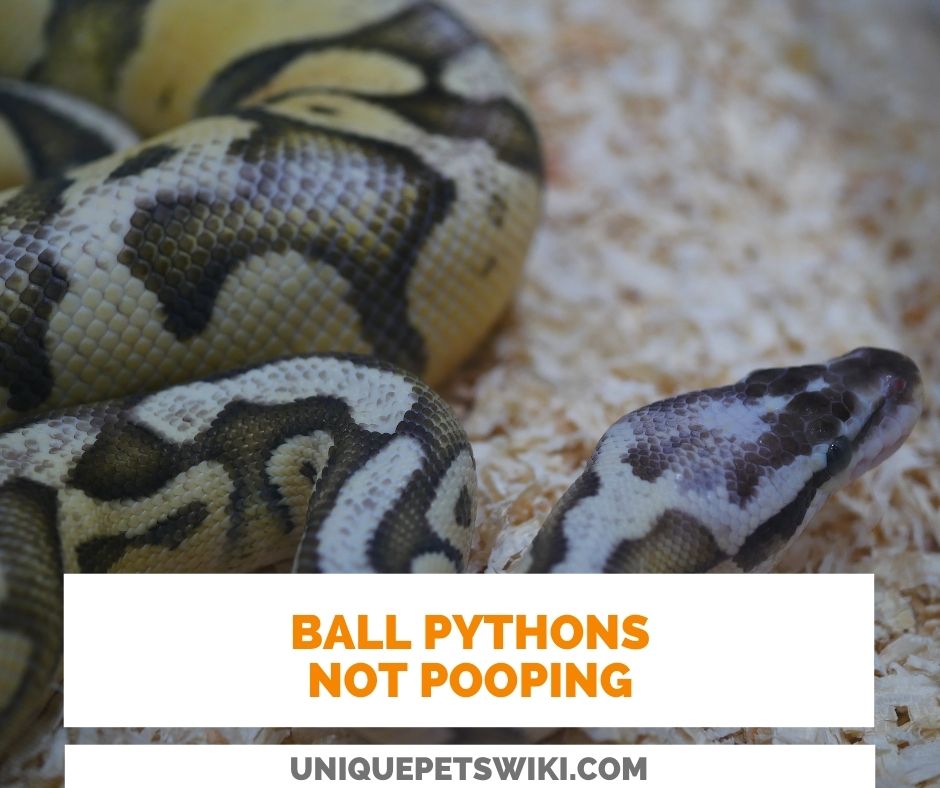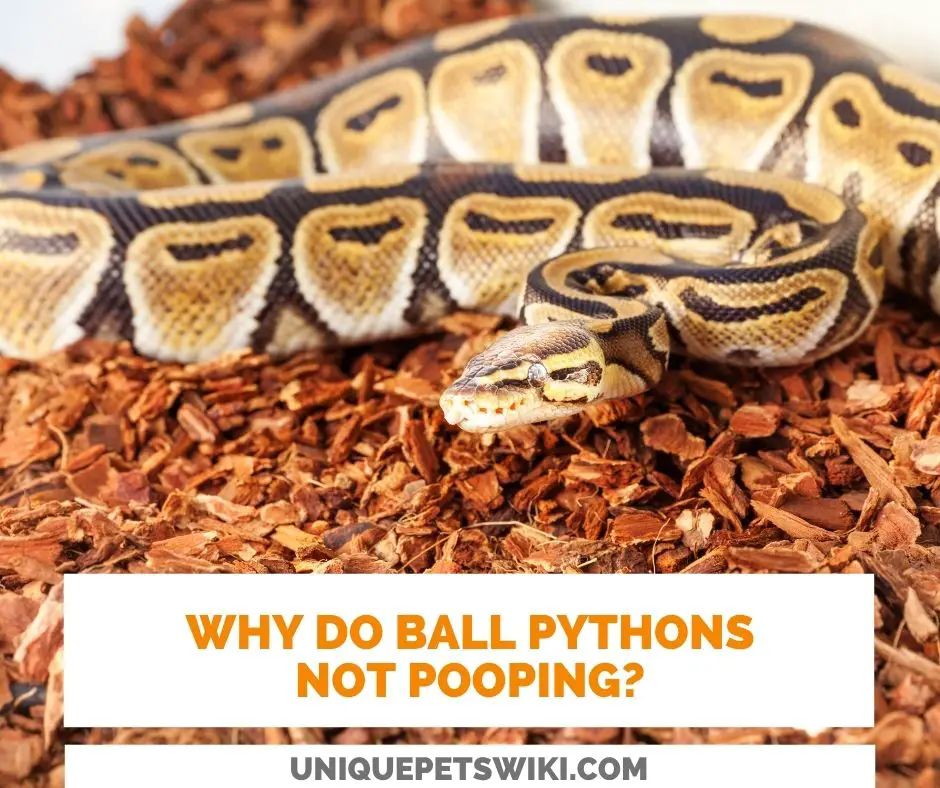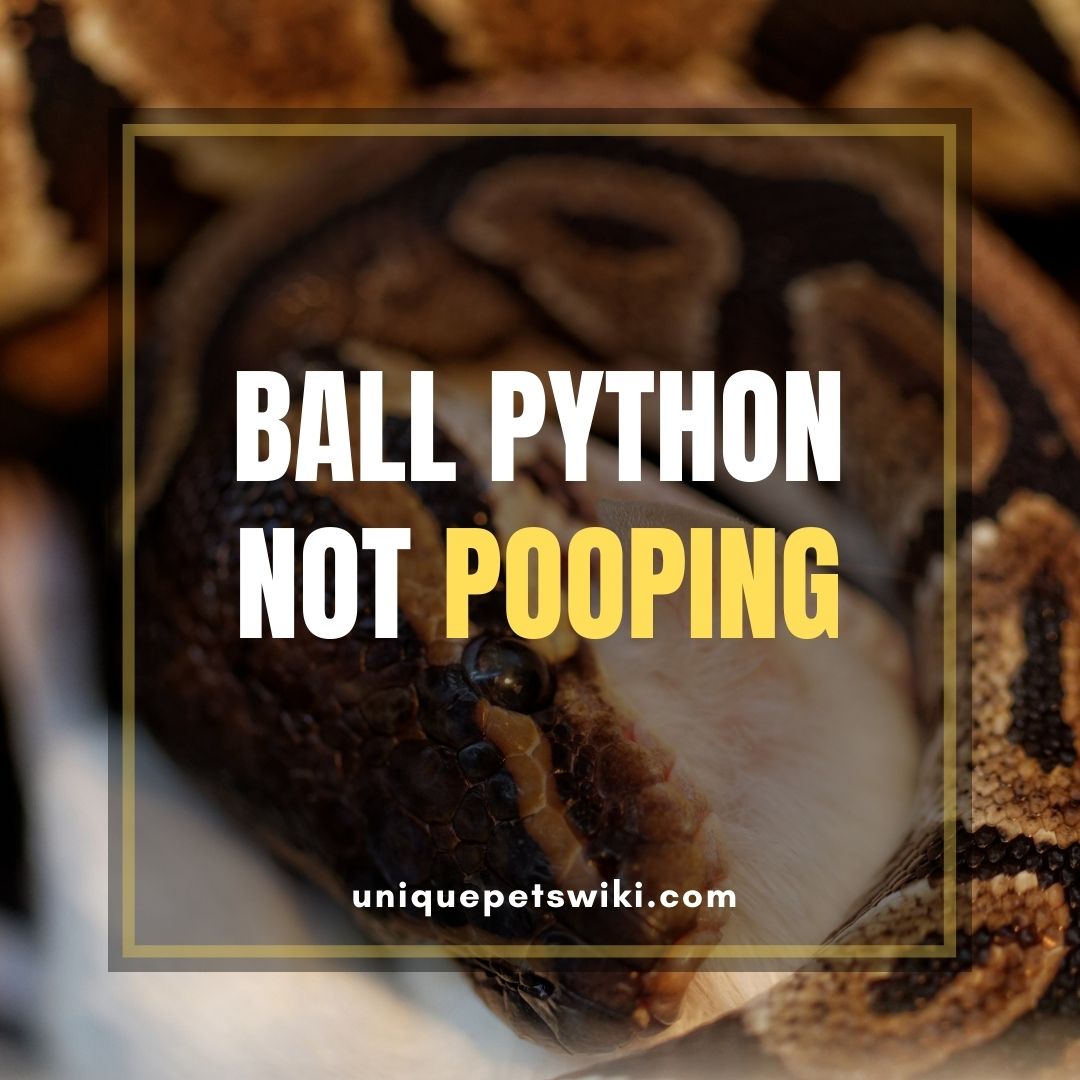Pooping is a general law of nature. In as much as there is an intake of food, pooping is expected. For ball pythons and other reptiles, the appearance and frequency of the poop is what often gets owners worried.
Ball pythons do not poop often as mammals do, but a regular pooping is expected. When this doesn’t happen regularly, this is when a concerned breeder becomes perplexed.
If this is what is happening to your pet ball python, you’ve come to the right place to seek information about your snake’s poop.
Whether you’re an experienced breeder or a beginner, this article promises to answer all questions relating to ball python poops. Keep reading.
This article has been reviewed by Dr. Gospel. Read more about our knowledge control process here.
Contents
- Ball Python Not Pooping: What Is That?
- When Can You Say That Your Ball Python Is Not Pooping?
- How Often Do Ball Pythons Poop?
- Why Are Your Ball Pythons Not Pooping?
- How Long Can Ball Pythons Go Without Pooping?
- Should I Feed My Ball Python If It Hasn’t Pooped?
- Are There Ways To Help Your Ball Python To Poop Without Visiting A Vet?
- When Do You Need To Worry If Your Ball Python Is Not Pooping?
- Wrapping Up
Ball Python Not Pooping: What Is That?

The process of pooping starts when an animal eats. Digestion takes place in a couple of hours to days.
After the nutrients from the food are absorbed into the body, the waste product is excreted out as poop. Ball pythons like every other animal excrete this fecal matter (poop) regularly through an opening called the cloaca.
The poop from a healthy ball python is usually solid and dark brown in color. Often, food particles like the prey’s teeth, feathers, and fur are seen in their fecal droppings. Their poop is usually accompanied by a chalky white or yellowish-white urate.
In rare cases, ball pythons will pass out liquid urine like mammals. Your ball pythons will poop a few days or weeks after eating. This usually takes about 5-10 days, just before they had the next meal.
Depending on the individual snake and its environment, ball pythons can hold their poop longer than two weeks. Some captive ball pythons will poop only once in a period of 1-3 months.
If your ball python stays longer than that without pooping and is still feeding normal, then you should be worried. In a nutshell, ball pythons not pooping is a condition where ball pythons do not drop fecal matter after a long time of eating.
When Can You Say That Your Ball Python Is Not Pooping?
As stated earlier, you can conclude that your ball python is not pooping after eating three times in succession without a fecal dropping.
A period of 1-4 weeks may be normal depending on how frequent you feed it. But if it extends longer than that, you need to evaluate your husbandry to find out why your pet isn’t pooping.
How Often Do Ball Pythons Poop?
Ball pythons will poop about the same time they are hungry. They have a strong digestive system and can digest food more than mammals. As a result, their waste product from a single meal may not be tangible enough to be pooped.
Ball pythons are cold-blooded. Thus, they need heat to digest food. A cage with insufficient heat will prolong their poops.
Typically, ball pythons eat between 5-10 days. Depending on the size of the prey and the temperature of the cage, the snake will poop almost the same time before the next meal.
In a nutshell, how often your ball python will poop depends on:
- How often you feed your snake,
- How large the feeder prey is, and
- How hot the cage is to aid digestion.
Why Are Your Ball Pythons Not Pooping?

From the already established facts, ball pythons will normally poop between 5 days to 3 weeks depending on the variables listed above. But in most cases, some ball pythons will not poop after one or two meals till the third meal.
If this is the case with your ball python, you need to worry less. However, anything longer than a month is abnormal. This is often caused by factors such as:
Improper Cage Temperatures
Ball pythons are cold-blooded animals which means that they need external heat from their enclosure to digest their food. When this heat isn’t adequately provided, they have difficulties digesting food. This can lead to constipation and regurgitation.
The temperature of the basking spot should be kept at 87-94 F. while the cool side should be maintained at 76-82 F.
Infrequent Feeding
How large and how often you feed your ball python determines how often it’ll poop. If your ball python is feeding on small-size prey, you shouldn’t expect it to poop after 3-4 meals.
This is because almost all the food is used up as energy for the body. The same thing applies to irregular feeding. A ball python that is not on a regular feeding schedule will not have waste matter to excrete.
Underfeeding your ball python will not only make your snake, not to poop but will lead to loss of weight.
Impaction or Constipation
Impaction or constipation is a condition where the fecal matter of the snake is too packed up (hard) such that evacuation becomes difficult. Initially, it may not harm the snake but if left unattended to for a longer time, then the snake will be affected adversely.
This condition is often caused by dehydration and improper cage temperatures. In some severe cases, surgery is required to get rid of impaction. More on this later, keep reading.
Shedding Period
When ball pythons are about to shed, they sometimes hold their poops until they’re done shedding. This is one other reason that will make ball pythons not to poop.
Slower Metabolism During Winter And Old Age
The digestive system of ball pythons tend to become slower during winter, especially during breeding. During this period, ball pythons will typically refuse to eat as well.
Also as ball pythons approach old age, their feeding frequency reduces likewise the rate at which they poop. Since they eat less during this period, they will not poop for a longer time.
Handling Snake After Feeding And Stress
These two factors go hand in hand with each other. If you have the habit of handling your snake too soon after feeding, your snake will become stressed. This can distort the digestion process and cause the snake not to poop.
It is recommended that you start handling your snake 4-5 days after it has eaten. This to avoid stress and for proper digestion process. Note that all other factors mentioned above if not kept at appropriate levels, will also cause stress to captive ball pythons.
How Long Can Ball Pythons Go Without Pooping?
Ball pythons can go as long as 3 weeks or one month without pooping. As earlier discussed, if the frequency at which you feed your snake is once or twice in a month, you should be expecting its poop within that same interval.
This is with regular drinking habits and adequate cage temperatures. With the wrong temperature and dehydration, the duration will be longer and it is not normal.
Should I Feed My Ball Python If It Hasn’t Pooped?
Yes, you can still feed your snake even though it hasn’t pooped after its last meal. This is however subject to your snake’s willingness to eat. If your snake still accepts food even though it is not pooping, you don’t have to worry.
But ensure that adequate water is provided for the snake to drink. At this point, you can go ahead to feed your snake. But if your snake isn’t pooping and is not accepting food either, you need to show concern. It’s likely that your snake is impacted or finding it difficult to digest its last meal.
Are There Ways To Help Your Ball Python To Poop Without Visiting A Vet?
Yes, there are ways you can help loosen the fecal matter to enable your pet to poop. Since you know what the causes are, you should be able to get rid of them and help your snake pass a bowel movement.
However, keep in mind that these home remedies should only be attempted on situations where the snake is healthy. If you suspect any symptom of health issues, the best thing to do is to visit a vet first.
That said, if your snake is in good health and is not pooping, here are what to do:
Provide Enough Fresh Drinking Water
Dehydration is a common cause of constipation and impaction. A situation where your snake is not having enough water to drink, it’ll not be able to poop as well. Thus, ensure that there’s always water for it to drink and soak in when desired.
Soak Its Feeder Prey
Ball pythons in the wild do not need a prey soak in water because the prey they consume is freshly killed. Hence, the water content is still intact. The process of thawing a frozen prey reduces the water content of the prey.
This makes it difficult for the snake to digest it properly. To regain back some of the water lost, try soaking the prey in water before giving it to your snake.
Increase The Humidity Level
Aside from maintaining a proper humidity level in its habitat, try increasing the humidity level if you’re trying to get your pet to poop. This will help soften the fecal matter in the intestine.
Also, check for the basking spot temperature to be sure it’s at appropriate levels. Keep in mind that without heat they find it difficult digesting their food.
Increase Prey Size
If you’ve been giving it smaller size prey, try feeding larger size prey. It might turn out that you’re underfeeding your snake which is why it is not pooping.
When a ball python is underfed, it may not poop for a longer time. That is because the whole food will be retained in the body for energy.
Give The Snake A Warm Soak
If after trying all other ways, your snake still has not poop, give it warm water to soak in. You can do this for about 10 – 20 minutes.
At the process, you can gently massage the underbelly close to the cloaca to help soften the poop. This usually works. Your snake is likely to poop after a bath (soak) in warm water.
Use Mineral Oil
As a last resort if your snake is not pooping, give it some mineral oil together with its food. This can only work if the snake is still accepting food.
Ensure that you don’t give too much of the oil. It should be given at a dosage of 1ml per 1kg of your snake’s total weight.
Consult A Vet
This is the final and most reliable but expensive way to get your snake to poop. If all other methods prove futile, then you have to take your pet to the vet for a medical examination.
When Do You Need To Worry If Your Ball Python Is Not Pooping?
You only need to worry if after feeding your snake consecutively for three times and it hasn’t pooped. Besides, if after attempting all the strategies discussed above your snake hasn’t passed a bowel movement, then you need to visit the vet for proper diagnosis.
Fully understanding your ball python will help you better take care of them. As a suggestion, we would recommend you to get a good ball python book. Not to become an expert on ball python care but will help you avoid the common mistake in new pet snake owners.
Last update on 2022-12-29 / Affiliate links / Images from Amazon Product Advertising API
Wrapping Up
Ensuring regular pooping is an important aspect of ball pythons’ care. It plays an important function in balancing the body system and ensuring that the snake is healthy.
A regular feeding and drinking will equate to a regular pooping. Similarly, irregular feeding and dehydration (insufficient water in the body) will result in not pooping. Aside from this, other internal and external factors could be responsible for this.
As discussed in this article, you must ensure that proper prey size and enough freshwater is provided for your snake. Also, ensure that you feed your snake regularly to avoid loss of weight.
Finally, in situations where your snake hasn’t pooped for a long time even after eating 4-5 or 6 times, endeavor to evaluate your husbandry to find out where the problem is. If all factors are kept normal, your ball python should poop regularly.

